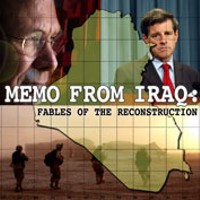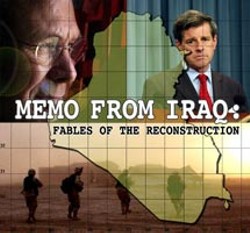Fables Of The Reconstruction
A Coalition memo reveals that even true believers see the seeds of civil war in the occupation of Iraq
By Jason VestBut according to a closely held Coalition Provisional Authority (CPA) memo written in early March, the reality isn't so rosy. Iraq's chances of seeing democracy succeed, according to the memo's author - a US government official detailed to the CPA, who wrote this summation of field reporting for a senior CPA director - have been severely imperiled by a year's worth of serious errors on the part of the Pentagon and the CPA, the US-led multinational agency administering Iraq. Far from facilitating democracy and security, the memo's author fears, US efforts have created an environment rife with corruption and sectarianism likely to result in civil war.
Provided to this reporter by a Western intelligence official, the memo was partially redacted to protect the writer's identity and to "avoid inflaming an already volatile situation" by revealing the names of certain Iraqi figures. A wide-ranging and often acerbic critique of the CPA, covering topics ranging from policy, personalities, and press operations to on-the-ground realities such as electricity, the document is not only notable for its candidly troubled assessment of Iraq's future. It is also significant, according to the intelligence official, because its author, a man, has been a steadfast advocate of "transforming" the Middle East, beginning with "regime change" in Iraq.
'The trigger for civil war'
Signs of the author's continuing support for the US invasion and occupation are all over the memo, which was written to a superior in Baghdad and circulated among other CPA officials. He praises Iraqi National Congress leader Ahmed Chalabi, and laments a lack of unqualified US support for Chalabi, a long-time favorite of Washington hawks. (It bears noting that Chalabi was tried and convicted in absentia by the Jordanian government for bank embezzlement, in 1989, and has come under fire more recently for peddling dubious pre-war intelligence to the US.) The author also asserts that "what we have accomplished in Iraq is worth it." When considering specific scenarios, he sometimes hews to an improbably sunny view. Violence is likely, he says, for only "two or three days after arresting" radical cleric Muqtada al Sadr, an event that would "make other populist leaders think twice" about bucking the CPA. Written only weeks ago, these predictions seem quite unwarranted, since simply trying to arrest al Sadr has resulted in more than two weeks of bloody conflict - with no end in sight - and seems to have engendered more cooperation between anti-Coalition forces than before.
Yet the memo is gloomy in most other respects, portraying a country mired in dysfunction and corruption, overseen by a CPA that "handle(s) an issue like six-year-olds play soccer: Someone kicks the ball and one hundred people chase after it hoping to be noticed, without a care as to what happens on the field." But it is particularly pointed on the subject of cronyism and corruption within the Governing Council, the provisional Iraqi government subordinate to the CPA responsible for re-staffing Iraq's government departments. "In retrospect," the memo asserts, "both for political and organizational reasons, the decision to allow the Governing Council to pick 25 ministers did the greatest damage. Not only did we endorse nepotism, with men choosing their sons and brothers-in-law; but we also failed to use our prerogative to shape a system that would work ... our failure to promote accountability has hurt us."
In the broadest sense, according to the memo's author, the CPA's bunker-in-Baghdad mentality has contributed to the potential for civil war all over the country. "[CPA Administrator L. Paul] Bremer has encouraged re-centralization in Iraq because it is easier to control a Governing Council less than a kilometer away from the Palace, rather than 18 different provincial councils who would otherwise have budgetary authority," he says. The net effect, he continues, has been a "desperation to dominate Baghdad, and an absolutism born of regional isolation." The memo also describes the CPA as "handicapped by [its] security bubble," and derides the US government for spending "millions importing sport utility vehicles which are used exclusively to drive the kilometer and a half" between CPA and Governing Council headquarters when "we would have been much better off with a small fleet of used cars and a bicycle for every Green Zone resident."
Speaking of News_break.html
-
A Gloomy Bush-iversary
Dec 15, 2004 -

Umberger Opts Out of Rep Reunion
Dec 8, 2004 -

Another Anchor Flies Channel 3 Coop
Sep 22, 2004 - More »
Latest in Arts
More by Jason Vest
-

Fables Of The Reconstruction
Apr 21, 2004 - More »






